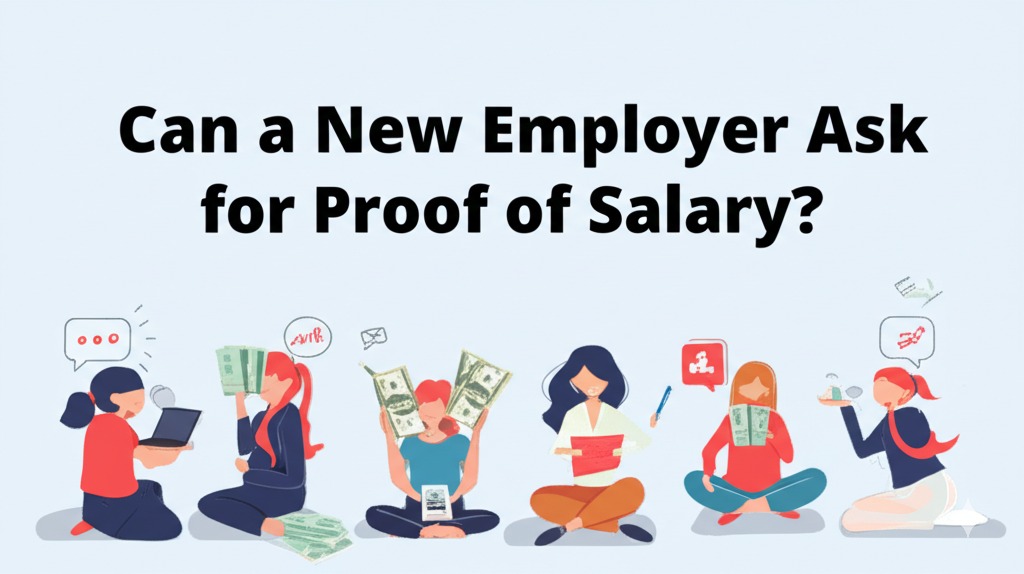
When you’re switching jobs, you’re often faced with a range of questions during the hiring process—some expected, and others more personal. One common yet controversial question is: Can a new employer ask for proof of your previous salary? It’s a topic that stirs debate among job seekers and HR professionals alike.
In this article, we’ll explore whether employers can legally request salary verification, why they might want it, what your rights are, and how to handle the situation if it arises. Whether you’re a seasoned professional or fresh on the job market, this guide will help you navigate this tricky topic confidently.
Is It Legal for Employers to Ask for Proof of Salary?
Varies by Location
The legality of salary history requests depends largely on local and state laws. In many places, it’s perfectly legal for employers to ask for your previous salary—but in others, it’s outright banned.
In the U.S., several states and cities have laws prohibiting employers from asking about or using prior salary history in hiring decisions. These include:
- California
- New York City
- Illinois
- Massachusetts
- Philadelphia
These laws are designed to promote pay equity and prevent wage discrimination, particularly against women and minorities who have historically been underpaid.
Private vs. Public Sector
In the private sector, salary verification requests are more common. However, even if it’s legal to ask, you are not always obligated to provide it.
In the public sector, salary data is often publicly available or more standardized, making salary disclosures less relevant.
Why Do Employers Want Proof of Salary?
Understanding the employer’s perspective can help you respond more strategically.
Common Reasons Include:
- Benchmarking your expectations against the role’s budget.
- Negotiation leverage to keep offers in line with your prior pay.
- Screening candidates to see if they fit within a pay range.
- Verifying resume claims, especially if bonuses or commissions are listed.
While these reasons may seem logical from a business standpoint, they can be problematic from an equity and privacy perspective.
Should You Share Your Previous Salary?
Weigh the Pros and Cons
Pros:
- May speed up the hiring process.
- Shows transparency and trust.
- Could result in a higher offer if your past salary was high.
Cons:
- May limit your earning potential if you were previously underpaid.
- Can invite bias during negotiation.
- In some locations, it’s your legal right to withhold that information.
If you choose to share, do so strategically. Provide a salary range rather than a fixed number, and emphasize the value you bring to the new role.
What Are Your Rights as a Job Seeker?
Know Your Local Laws
Always check the local employment laws in your area. You can find up-to-date information on your state labor department website or legal aid resources.
You Can Decline Politely
If you’re uncomfortable sharing your salary history, here are a few polite ways to respond:
- “I prefer to focus on the value I bring to this role.”
- “In accordance with local laws, I’d rather discuss salary expectations than past earnings.”
- “My previous roles had different scopes, so I’d like to focus on this opportunity instead.”
Alternatives Employers May Use
Even in places where salary questions are banned, some employers may try to get around it by:
- Asking for your salary expectations instead of history.
- Looking up publicly available data (e.g., in government jobs).
- Requesting pay stubs or W-2 forms—though this is rare and may raise privacy concerns.
If you’re asked to provide proof of salary, you are within your rights to:
- Ask why it’s needed.
- Provide alternative documentation, like a job offer letter that lists your compensation.
- Decline the request if it makes you uncomfortable.
Tips for Navigating Salary Discussions
Be Prepared
Before your interview:
- Research the market rate for your position using sites like Glassdoor, Payscale, or Salary.com.
- Know your bottom line and target range.
- Practice responses to salary-related questions.
Focus on Value
Instead of getting caught in past numbers, shift the conversation to:
- Your skills and accomplishments.
- The impact you’ve had in previous roles.
- How you plan to contribute to the new company.
This approach positions you as a candidate worth investing in, regardless of your past pay.
Conclusion: Know Your Worth, Protect Your Privacy
So, can a new employer ask for proof of salary? Legally, it depends—but ethically and strategically, the answer is more nuanced. While employers may have valid reasons for wanting to know, you’re not always obligated to share—especially in regions where it’s illegal to ask.
The key is to be informed, confident, and prepared. Know your rights, research your worth, and approach salary conversations with a mindset that reflects your true value.

Andre Cuevas provides career insights, job search strategies, and professional advice to help individuals navigate the job market and achieve their career goals.





